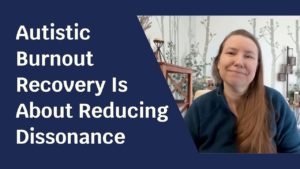
People mean different things by thought work
When I start talking about dissolving painful thoughts, some people get nervous that I’m getting into CBT, or going to try to convince them that all the difficulties they’re having are all just in their head and if they just thought about it differently, everything would be fine.
Neither of those are the kind of thought work that I am talking about.
Let me be clear: I do not agree with, support, or in any way endorse dismissing peoples’ lived experiences. I’ve experienced too much of that myself, and I’ll bet you have, too. I can’t stand it and try not to do it.
Here’s what DO mean.
When you go through something painful, it really is painful. It is also true that the way we think about those painful experiences can create more pain. It’s the additional pain that’s created by our thoughts that I want to play with.
I’m using the word “play” intentionally here. Characterizing it as playful invites judgment-free curiosity, which engages more of the right hemisphere of the brain which, in turn, activates a variety of processes that reduce stress and intensity, invite problem-solving, and open up new options that you either may not have encountered, or had an internal block to putting into practice.
My own experience with this
Here’s an example from my own life. When things got weird with my high school best friend (I don’t want to get into details here; they’re not relevant anyway), it really did hurt to lose someone that I had enjoyed talking with, and spending time with, and who was pretty much the only person that I really felt comfortable and safe being myself around (as well as I knew myself at the time).
But when I complained that I would never have another friend, because I didn’t know how to make friends, and people don’t respond well to me, and no one understands me, and on, and on, it really felt true at the time, and for a long time thereafter.
Even after I made friends in college, I didn’t trust they were real, or would last, or that they actually liked me and weren’t just saying that to be polite, or letting me hang out with them out of pity. Even despite having mostly neutral or reasonably positive experiences with other people. I defaulted to charactering every negative encounter or comment about me being “weird” or disapproving look as showing their real selves, and dismissed every approving comment or positive engagement as false pretense.
Since I was largely following social scripts that I had learned, and would say things like, “I’m fine” when I didn’t mean it, or that I liked someone’s artwork when I really didn’t think it was that good, I assumed that everyone else was being completely fake at all times, especially when they said that they liked me or valued me in any way.
It didn’t matter who it was from; I couldn’t take it in.
Because I had these painful thoughts in my head: That no one really says what they mean. Or that you can’t trust them to say what they mean. That people only want to get things out of me for their benefit; they don’t really care about me. The friendships aren’t real. That you can’t trust people.
It didn’t sink in for a very, very long time that something else might be true.
Dissolving the painful thoughts
It started with looking deep inside and identifying those painful thoughts, bringing them into conscious awareness, and questioning every single one of them.
Which didn’t make them *poof* disappear. It’s not like I was suddenly convinced that everyone was safe and trustworthy and everyone wanted to be my friend and blah blah crap shit. Of course the opposite of a painful thought is not necessarily true.
There are plenty of people who are untrustworthy and are out to get you, or are saying things just to be nice, and they don’t really mean them. But that’s not everyone, and not all the time.
Questioning those thoughts opened up a little bit of room in my mind that let me look around my life at the few people who have stuck with me through my worst, hardest times, and have helped me even when they got nothing tangible out of it, and when I wasn’t even giving them feel good vibes for their effort.
I started questioning my assumptions that they were just doing it to follow social scripts and didn’t really mean it. Why the hell would they have stuck with me during my worst depressions and burnouts and health troubles and being mean and rude (because I just didn’t care anymore), for the sake of social scripts? Especially non-family members who had no societal expectations of sticking around? (And even my mom didn’t have to put up with my crap.)
When I started reconsidering my assumptions, I started looking at my relationships with a few key people in new ways. I started valuing those relationships more. Which, over the course of a few months, led me to start putting more effort into those relationships, but in very different ways than I had before.
my problem-hacking Autistic brain went to work on learning and inventing new ways to communicate and to build relationships
Which grew and deepened those relationships, as we each felt more comfortable with the other, and more comfortable being ourselves with the other. And as we each shared more, and more authentically (which I would later call unmasking), we each learned how to adjust to accommodate the other, because we valued our relationship enough to put in the effort.
It was a slow and gradual process, and is still ongoing, but now it is not true that there is no one who likes me for who I am. It is true that I have five close and healthy friendships, and a much better relationship with my mom, and much healthier relationships with other people in my life who aren’t as close, but are still part of my world and I’m part of theirs.
All of those things that I had thought about myself turned out not to be true (all of the time). They were probably never true all of the time. But I got it stuck in my head that they were, and that got in the way of doing anything differently.
The difference in this kind of thought work
I want to point out here that I never tried to convince myself that the relationship with my best friend in high school going bad wasn’t a real thing. Or that it didn’t hurt. Or that there weren’t genuine issues between us. Or that I didn’t need to learn healthier relationship skills. I also did not try to convince myself that everyone is safe, trustworthy, or that I just need to give them another chance. I don’t believe that.
The part that I worked with is assuming that just because that has been true (repeatedly, many times in my life) that there is no chance for anything to be different, ever.
When I put it into the context that the relationship dynamics that I (and others) had learned were not going to produce the types of meaningful relationships that I wanted, my problem-hacking Autistic brain went to work on learning and figuring out new ways to communicate and to build relationships, that have directly led to the relationships that I now greatly value in my life.
So this is the kind of thought work I’m talking about.
Whether it’s in reference to ‘painful thoughts’ in other blog articles, or in my YouTube videos, or in my anti-anxiety course, in which I model how to do this in detail, or anything else that I create in the future, I want to be clear that this is what I’m talking about.




